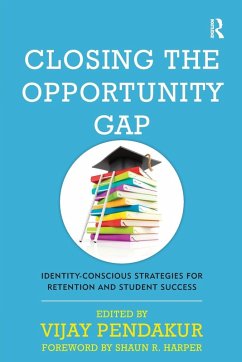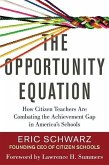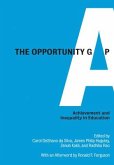Closing the Opportunity Gap
Identity-Conscious Strategies for Retention and Student Success
Herausgeber: Pendakur, Vijay
Closing the Opportunity Gap
Identity-Conscious Strategies for Retention and Student Success
Herausgeber: Pendakur, Vijay
- Broschiertes Buch
- Merkliste
- Auf die Merkliste
- Bewerten Bewerten
- Teilen
- Produkt teilen
- Produkterinnerung
- Produkterinnerung
This book contends that the gap between cultural/diversity centers and institutional retention efforts is both a missed opportunity and one that perpetuates the opportunity gap between students of color and low-income students and their peers.
Andere Kunden interessierten sich auch für
![Closing the Education Gap Closing the Education Gap]() Georges VernezClosing the Education Gap22,99 €
Georges VernezClosing the Education Gap22,99 €![GOT THIRD GRADE In The Bag! - Want Me To Explain A SIGHT WORD? Try Me!: SIGHT WORD MASTERY SENTENCES - Closing the Achievement Gap GOT THIRD GRADE In The Bag! - Want Me To Explain A SIGHT WORD? Try Me!: SIGHT WORD MASTERY SENTENCES - Closing the Achievement Gap]() Viola Grays-WileyGOT THIRD GRADE In The Bag! - Want Me To Explain A SIGHT WORD? Try Me!: SIGHT WORD MASTERY SENTENCES - Closing the Achievement Gap12,99 €
Viola Grays-WileyGOT THIRD GRADE In The Bag! - Want Me To Explain A SIGHT WORD? Try Me!: SIGHT WORD MASTERY SENTENCES - Closing the Achievement Gap12,99 €![Closing the Attainment Gap in Schools Closing the Attainment Gap in Schools]() Antony LubyClosing the Attainment Gap in Schools195,99 €
Antony LubyClosing the Attainment Gap in Schools195,99 €![The Opportunity Equation: How Citizen Teachers Are Combating the Achievement Gap in America's Schools The Opportunity Equation: How Citizen Teachers Are Combating the Achievement Gap in America's Schools]() Eric SchwarzThe Opportunity Equation: How Citizen Teachers Are Combating the Achievement Gap in America's Schools16,99 €
Eric SchwarzThe Opportunity Equation: How Citizen Teachers Are Combating the Achievement Gap in America's Schools16,99 €![The Opportunity Gap The Opportunity Gap]() The Opportunity Gap32,99 €
The Opportunity Gap32,99 €![Mind the Gap Mind the Gap]() Mind the Gap45,99 €
Mind the Gap45,99 €![Gateway to Opportunity? Gateway to Opportunity?]() J. M. BeachGateway to Opportunity?48,99 €
J. M. BeachGateway to Opportunity?48,99 €-
-
-
This book contends that the gap between cultural/diversity centers and institutional retention efforts is both a missed opportunity and one that perpetuates the opportunity gap between students of color and low-income students and their peers.
Hinweis: Dieser Artikel kann nur an eine deutsche Lieferadresse ausgeliefert werden.
Hinweis: Dieser Artikel kann nur an eine deutsche Lieferadresse ausgeliefert werden.
Produktdetails
- Produktdetails
- Verlag: Routledge
- Seitenzahl: 188
- Erscheinungstermin: 29. Februar 2016
- Englisch
- Abmessung: 229mm x 152mm x 10mm
- Gewicht: 282g
- ISBN-13: 9781620363126
- ISBN-10: 1620363127
- Artikelnr.: 44270020
- Verlag: Routledge
- Seitenzahl: 188
- Erscheinungstermin: 29. Februar 2016
- Englisch
- Abmessung: 229mm x 152mm x 10mm
- Gewicht: 282g
- ISBN-13: 9781620363126
- ISBN-10: 1620363127
- Artikelnr.: 44270020
Vijay Pendakur Dr. Vijay Pendakur serves as an Associate Vice President for Student Affairs at California State University - Fullerton. Prior to joining Cal State Fullerton, Dr. Pendakur served as the Director for the Office of Multicultural Student Success, a department charged with increasing the retention and persistence of low-income students, first generation students, and students of color at DePaul University in Chicago. He holds a bachelor's degree in history and East Asian studies from the University of Wisconsin, Madison, a master's degree in U.S. history from the University of California, San Diego, and a doctorate in education from DePaul University. Shaun R. Harper, PhD, is a professor in the Marshall School of Business at the University of Southern California, and is the USC Race and Equity Center Executive Director. He is an expert on racial, gender, and LGBT issues in corporations, law firms, Hollywood production companies, and universities. He also is an expert on college sports. He offers organizations live, and high-quality virtual experiences on a range of topics pertaining to equity, diversity, and inclusion in business and on campus.Dr. Harper has consulted with more than 200 businesses and institutions on strategies related to equity, diversity, and inclusion. He has published over 100 peer-reviewed journal articles and other academic publications, and procured $13 million in research grants. He is presently working on Equity, Diversity, and Inclusion in Business, his 13th book. His research has been cited in over 12,000 published studies. The Wall Street Journal, New York Times, Fortune, Washington Post, Black Enterprise, and several thousand other news outlets have quoted Professor Harper and featured his research. He has been interviewed on CNN, ESPN, and NPR.Prior to becoming a faculty member, he was Assistant Director of MBA Admissions for the Indiana University Kelley School of Business. Dr. Harper spent a decade at the Universi
Foreword. Shaun R. Harper Introduction. Two distinct paths and a missed
opportunity. Vijay Pendakur1. Family Engagement for First-Generation
Families and Families of Color. Andrea Arzuaga 2. Retaining and Graduating
Empowered Men of Color. Eric Mata and André Bobb 3. Identity-Conscious
Approaches to First-Year, Peer-to-Peer Retention Programs. Sara Furr 4. The
Promise and Challenge of Leadership Development for Women of Color. Tomika
Rodriguez 5. Social Capital. Identity-Conscious Leadership Development
Curricula for Students of Color. Jeff Brown and Nydia María Stewart 6.
Career Discernment and Career Capital Development for Students of Color and
First-Generation College Students. Richard P. Morales and Eric Mata 7.
Empowerment Agents. Developing Staff and Faculty to Support Students at the
Margins. Sumun L. Pendakur 8. Food, Shelter, and Success. Mitigating Risk
for Low-Income College Students. Art Munin and Michele Enos Conclusion.
Tying It All Together. Vijay Pendakur Afterword. Vijay Pendakur Editor and
Contributors Index
opportunity. Vijay Pendakur1. Family Engagement for First-Generation
Families and Families of Color. Andrea Arzuaga 2. Retaining and Graduating
Empowered Men of Color. Eric Mata and André Bobb 3. Identity-Conscious
Approaches to First-Year, Peer-to-Peer Retention Programs. Sara Furr 4. The
Promise and Challenge of Leadership Development for Women of Color. Tomika
Rodriguez 5. Social Capital. Identity-Conscious Leadership Development
Curricula for Students of Color. Jeff Brown and Nydia María Stewart 6.
Career Discernment and Career Capital Development for Students of Color and
First-Generation College Students. Richard P. Morales and Eric Mata 7.
Empowerment Agents. Developing Staff and Faculty to Support Students at the
Margins. Sumun L. Pendakur 8. Food, Shelter, and Success. Mitigating Risk
for Low-Income College Students. Art Munin and Michele Enos Conclusion.
Tying It All Together. Vijay Pendakur Afterword. Vijay Pendakur Editor and
Contributors Index
Foreword. Shaun R. Harper Introduction. Two distinct paths and a missed
opportunity. Vijay Pendakur1. Family Engagement for First-Generation
Families and Families of Color. Andrea Arzuaga 2. Retaining and Graduating
Empowered Men of Color. Eric Mata and André Bobb 3. Identity-Conscious
Approaches to First-Year, Peer-to-Peer Retention Programs. Sara Furr 4. The
Promise and Challenge of Leadership Development for Women of Color. Tomika
Rodriguez 5. Social Capital. Identity-Conscious Leadership Development
Curricula for Students of Color. Jeff Brown and Nydia María Stewart 6.
Career Discernment and Career Capital Development for Students of Color and
First-Generation College Students. Richard P. Morales and Eric Mata 7.
Empowerment Agents. Developing Staff and Faculty to Support Students at the
Margins. Sumun L. Pendakur 8. Food, Shelter, and Success. Mitigating Risk
for Low-Income College Students. Art Munin and Michele Enos Conclusion.
Tying It All Together. Vijay Pendakur Afterword. Vijay Pendakur Editor and
Contributors Index
opportunity. Vijay Pendakur1. Family Engagement for First-Generation
Families and Families of Color. Andrea Arzuaga 2. Retaining and Graduating
Empowered Men of Color. Eric Mata and André Bobb 3. Identity-Conscious
Approaches to First-Year, Peer-to-Peer Retention Programs. Sara Furr 4. The
Promise and Challenge of Leadership Development for Women of Color. Tomika
Rodriguez 5. Social Capital. Identity-Conscious Leadership Development
Curricula for Students of Color. Jeff Brown and Nydia María Stewart 6.
Career Discernment and Career Capital Development for Students of Color and
First-Generation College Students. Richard P. Morales and Eric Mata 7.
Empowerment Agents. Developing Staff and Faculty to Support Students at the
Margins. Sumun L. Pendakur 8. Food, Shelter, and Success. Mitigating Risk
for Low-Income College Students. Art Munin and Michele Enos Conclusion.
Tying It All Together. Vijay Pendakur Afterword. Vijay Pendakur Editor and
Contributors Index







